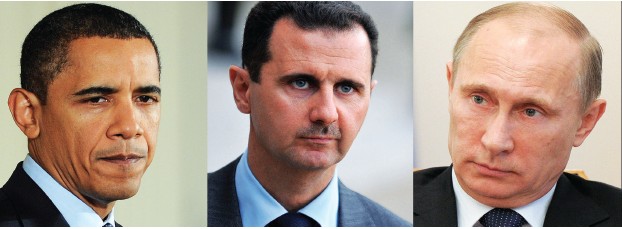(IP) The political overture offered by Russia and hammered out in meetings between Russia and the US – the collection and subsequent destruction of Syria’s chemical weapons stockpile – has temporarily defused the rapidly ticking time bomb lit by the US and its western allies. Diplomacy has forced a diplomatic ‘time-out’ in the rush of the Obama administration to direct a ‘limited’ strike against Syria. China, the UK, and France have lauded the plan on condition of its implementation. Syria apparently had no reservations and accepted the opportunity, along with other nations, to avert world war.The conditions set out dictate the surrender of all chemical weapons in the possession of the Syrian government to an international body which will expedite their removal and destruction. Syrian President Bashar Al Assad has also agreed to become a signatory of the Organization for the Prohibition of Chemical Weapons (OPCW). Russian President Putin, in an op-ed address to America published on September 11 in the New York Times, stated unequivocally the dire consequences of adding fire to fire by attacking Syria, citing how the circumventing of international law and failure to defer to the decision of the UN Security Council will erode the validly and strength of those bodies, causing the UN itself – like the League of Nations – to collapse.
Observers now suggest that similar force should, like the pretext of the agreement with Syria on chemical weapons, be used to pressure Israel to follow suit, as demanded by the US and Russia, to ratify the international treaty banning the use of chemical weapons, which Israel signed in 1993.
The factor that prefaced escalation of US military action in the Syrian conflict – the use of chemical weapons by the Assad regime against his people – has been disputed since the atrocities occurred; both times with no conclusive proof against the Assad regime. Yet, these findings were flaunted. Once again, even before any official investigation could take place, the Syrian government was implicated in the deaths of over 1,400 Syrian people after exposure to chemical agents. After weeks of debate, an Associated Press report surfaced (that was eventually suppressed) which stated that Yahyah Ababneh, of the Minit Press, interviewed some Syrian rebels who claimed that chemical weapons were discharged accidentally by Syrian rebels due to mishandling. The story was picked up by an Associated Press reporter: “The interviews were conducted by Ababneh of residents, rebels and their families in Damascus and Ghouta are putting together a different picture of what happened. Many believe that rebels received chemical weapons provided through the Saudi intelligence chief, Prince Bandar bin Sultan. It's being reported that these weapons are responsible for the deadly gas attack.
The father of a rebel who was killed in what's now being called an accident by many in Ghouta and Damascus said: "My son came to me two weeks ago asking what I thought the weapons were that he had been asked to carry,” said Abu Abdel-Moneim. The father said at least 12 rebels including his son were killed by the chemical weapons.
Allegedly, they were killed in the tunnel that was used to store the chemicals. These were provided by a Saudi militant, known as Abu Ayesha. He is said to be leading a fighting battalion in the effort to unseat Assad.
Ababneh reported that the rebels said the gas "attack" was the result of them mishandling the chemical weapons they acquired from the Saudis. She said in the Mint Press report the following:
"They didn’t tell us what these arms were or how to use them,” complained a female fighter named ‘K.’ She, like other Syrians, do not want to use their full names for fear of retribution.“We didn’t know they were chemical weapons. We never imagined they were chemical weapons.” A well-known rebel leader in Ghouta [on the outskirts of Damascus] named ‘J’ agreed. “We were very curious about these arms. And unfortunately, some of the fighters handled the weapons improperly and set off the explosions."
Prince Bandar's intelligence agency is said to have been the first to bring allegations that Assad's regime used Sarin gas in February of 2013.
It is a well-known fact that Saudi Arabia is one of the primary financiers of the Syrian rebels from the outset of their rebellion and control of the global oil and gas markets is the stimulus for the relentless crusade to rein in Syria and Iran.
A meeting between Russian President Putin and Saudi Prince Bandar reportedly occurred this summer, during which Bandar, in no uncertain terms, threatened Russia to relinquish its support of the Assad regime. Afterwards, an urgent alert was issued from the office of President Putin to the Armed Forces of the Russian Federation ordering a “massive military strike” against Saudi Arabia in the event that the West attacked Syria.
Main Image:

Thumbnail Image:

Main Image Credit:
“We must stop using the language of force and return to the path of civilized diplomatic and political settlement… We are all different, but when we ask for the Lord’s blessings, we must not forget that God created us equal.” Russian President Vladimir Putin in New York Times Op-Ed.






